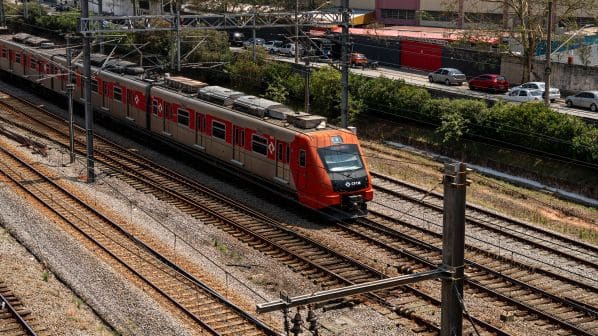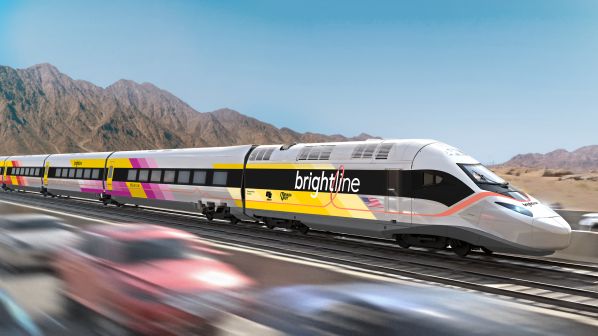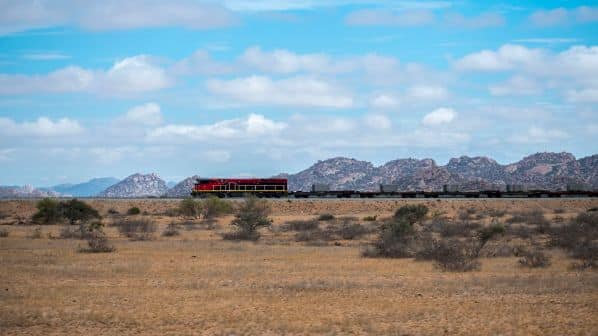São Paulo inter-city rail
Country: Brazil
Type: Main line
Construction Start: 2024
Completion: 2031
Length: 136km
Cost: $US 2.66bn

The project involves upgrading the São Paulo - Campinas main line for 160km/h operation and electrifying the line north of Francisco Morato at 3kV dc. This would enable an inter-city service to be introduced between Barra Funda in São Paulo and Campinas with one intermediate stop in Jundiaí and a regional service between Jundiaí and Campinas serving three new intermediate stations at Louveira, Vinhedo and Valinhos. A 30-year concession will be awarded to implement the project and operate the new passenger services. The concessionaire would also take over the operation of São Paulo Metropolitan Trains’ (CPTM) Line 7/Ruby commuter rail service (pictured) which operates on the southern part of the line. The Secretariat of Investment Partnerships (SPI) of São Paulo state has already published a revised tender notice for the project and the winning bidder is due to be selected by auction on February 29 2024. The regional service is expected to start in 2029 followed by the inter-city service in 2031.
Guatemala railway reopening
Country: Guatemala
Type: Main line
Construction Start: 2024
Completion: 2027
Length: 800km
Cost: $US 1.75bn
Work could start this year on the delayed scheme to rebuild Guatemala’s defunct 914mm-gauge railway as a standard-gauge network. The objective is to serve the country’s Caribbean and Pacific ports and to connect with the North American rail network via Mexico. New lines will be built to the borders with El Salvador and Honduras. The project is being developed and financed by a private company called Remed. The 800km project will be implemented in three stages. Stage 1 mainly comprises an upgrade of the 235km running from Tecún Umán on the Mexican border via Río Bravo and Santa María (north of Obrero) to Puerto Quetzal. Stage 2 involves upgrading the 317km section from Puerto Barrios and Santo Tomás de Castilla to Zacapa and Guatemala City, and the 89km Guatemala City - Santa María line. Stage 3 involves construction of a new 91km line from Obrero to the border with El Salvador.
Pacific Train project
Country: El Salvador
Type: Main line
Length: 103km
Cost: $US 700m
The Pacific Train project involves building a new standard-gauge line initially to connect the coast with the capital. Design work is already underway on a new line from Acajutla on the coast via Sonsonate and Caserio Sitio del Niño to San Salvador. The project is part of the country’s new Regional Mobility and Logistics Master Plan. The government favours new construction using the existing railway right of way where possible, rather than trying to revive the abandoned 555km, 914mm-gauge network, which closed in 2002. Information regarding the rest of the 535km of planned new railway have not been disclosed, although the objective is to connect the new rail network with Guatemala, which is reviving its railway. The master plan commits El Salvador to investing $US 1.83bn in railway infrastructure over the next decade, including a monorail in the Greater San Salvador area.
São Paulo light rail
Country: Brazil
Type: Light rail
Construction Start: 2024
Completion: 2027
Length: 12km
Cost: $US 748.2m
The city of São Paulo plans to start construction of two light rail lines in the city centre this year. The Reais 3.7bn ($US 748.2m) project will be partly funded through the federal government’s Growth Acceleration Programme (PAC). The Red Line will form a figure of 8 while the Blue Line will comprise a circle, with the two lines intersecting on São João Avenue. The two lines will be operated by five-section LRVs each with capacity for almost 450 passengers. Demand is estimated at 134,000 passengers per day. The LRVs will be powered by a ground power supply system rather than overhead catenary to reduce the system’s environmental impact.
Lobito Corridor extension
Country: Angola/Zambia
Type: Main line
Length: 760km
The African Development Bank (AfDB) and Africa Finance Corporation (AFC) have joined the United States, the European Union (EU), Angola, the Democratic Republic of Congo (DRC), and Zambia in signing a memorandum of understanding (MoU) to develop the 1067mm-gauge Lobito Corridor and the new Angola - Zambia line. The AFC has been appointed lead project developer to work with the other signatories. The proposed line runs from Luacano on the existing Benguela Railway in Angola to the Jimbe border crossing, a distance of around 260km, and then for another 500km in Zambia to Kalumbila and Chingola to connect with the existing network, which runs across the border to the DRC. AFC president and CEO, Mr Samaila Zubairu, says the project presents a transformative opportunity to enhance regional connectivity, unlock the critical minerals supply chain, promote trade, create local jobs, and drive economic growth in Africa.
Ain Sokhna - Marsa Matrouh high-speed line
Country: Egypt
Type: High-speed
Construction Start: 2022
Completion: 2027
Length: 685km
Cost: $US 4.5bn
The 675km Ain Sokhna - Marsa Matrouh high-speed line will run from Ain Sokhna on the Red Sea to October Gardens, Alexandria, El Alamein and Mersa Matruh on the Mediterranean, plus a branch from October Gardens to Al-Ayat, with 21 stations. In January 2021, the National Authority for Tunnels (NAT) signed a memorandum of understanding (MoU) with Siemens Mobility, Orascom Construction and Arab Contractors to design, build, equip and commission the new line. Phase 1 will be 460km long and connect the developing city of El Alamein on the Mediterranean Sea to Ain Sokhna on the Red Sea via the New Administrative Capital to the east of Cairo, which is under construction with completion set for 2027. Phase 2 will be 200km long and extend the line from El Alamein to Marsa Matrouh. The line, which will have a design speed of 250km/h, will carry freight and passenger services, with express services operating at 200km/h, regional trains running at 160km/h and freight at 120km/h. Once completed, the line is forecast to carry 30 million passengers annually, cutting journey times by 50%.
Tanzania Standard-Gauge Railway
Country: Tanzania
Type: Main line
Construction Start: 2018
Completion Lots 1 and 2: 2024
Length: 1225km
Cost: $US 10.4bn
The new 1435mm-gauge railway will run from Dar es Salaam via Morogoro, Dodoma, Tabora, and Isaka to Mwanza on Lake Victoria, with a branch from Tabora to Kigoma on Lake Tanganyika and north to Kigady. Yapi Merkezi, in partnership with Mota-Engil Africa, was awarded SGR lots 1, 2 and 3 covering the 1090km from Dar es Salaam to Tabora in 2018. Yapi Merkezi signed a $US 900m contract in July 2022 to build the 165km Lot 4 from Tabora to Isaka. By October 2023, lots 1 and 2 were 98% and 95% complete respectively, and work on both sections is expected to finish early this year. Completion of lots 3 and 4 is expected in early 2026, with these sections now 67% and 17% complete respectively. Lot 5, covering the 234km from Isaka to Mwanza, has been awarded to China Civil Engineering Construction and China Railway Construction Corporation and is 36% complete. The African Development Bank (AfDB) has agreed to contribute $US 3.05bn towards funding Lot 6 from Tabora via Uvinza to Kigoma, and Lot 7 covering the 156km section from Uvinza north to Kigady near the border with Burundi.
Brightline West HSL
Country: United States
Type: High-speed
Construction Start: 2024
Completion: 2028
Length: 350.7km
Cost: $US 12.5bn

Brightline West says that it hopes to begin construction early this year on the long-planned high-speed line from Las Vegas, Nevada, to southern California. Construction between Las Vegas and Victoriaville, California, has been approved, and the Federal Railroad Administration (FRA) has released an environmental assessment report for the 79km stretch through the Cajon Pass from the Victor Valley to Rancho Cucamonga between Los Angeles and San Bernadino. Brightline West expects to offer a journey time of 2h 10min, operating trains at 45-minute intervals at a top speed of 290km/h on the single-track railway. This is more than twice as fast as the equivalent journey by road. In December 2023, Brightline West secured $US 3bn from the federal government to support construction.
High-Frequency Rail
Country: Canada
Type: Main line
Completion: Mid-2030s
The project is aimed at providing an improved railway between Toronto, Peterborough, Ottawa, Montréal, Trois-Rivières and Québec City with trains travelling at up to 200km/h on mainly new, electrified and dedicated tracks that extend over 1000km. A Request for Proposals (RFP) was launched in October 2023 following the shortlisting of three consortia in July to work with project organisation Via HFR on design and development: The consortia are: Cadence, comprising CDPQ Infra, SNC-Lavalin, Systra and Keolis; Intercity Rail Developers, comprising Intercity Development Partners, EllisDon Capital, Kilmer Transportation, First Rail Holdings, Jacobs, Hatch, CIMA+, FirstGroup, RATP Dev, and Renfe; and QConnexiON Rail Partners, comprising Fengate, John Laing, Bechtel, WSP and German Rail (DB). The RFP stage will run until this summer. RFP bidders will be required to develop two solutions, including proposals enabling passenger trains to operate at up to 200km/h. The second solution must include high-speed segments for higher speed.
For detailed data on rail projects in North America, South/Central America, Africa and around the world, subscribe to IRJ Pro.

